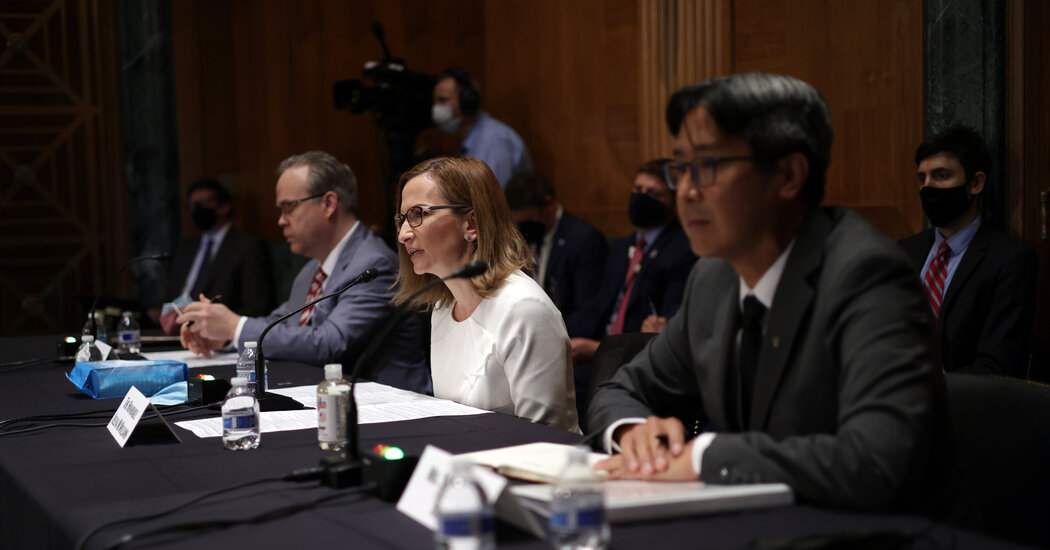A partisan fight atop a sleepy bank regulator intensified on Tuesday, with Democratic members of the Federal Deposit Insurance Corporation board sa
A partisan fight atop a sleepy bank regulator intensified on Tuesday, with Democratic members of the Federal Deposit Insurance Corporation board saying its Republican chairwoman was subverting the majority’s will.
Rohit Chopra, a member of the F.D.I.C. board and the new director of the Consumer Financial Protection Bureau, complained that the chairwoman, Jelena McWilliams — a Trump appointee — had refused to recognize their attempts to review rules about bank mergers.
“This approach to governance is unsafe and unsound,” he said in a statement. “It is also an attack on the rule of law.”
At a virtual meeting earlier Tuesday, Ms. McWilliams, the board’s lone Republican, struck down Mr. Chopra’s request to record in the minutes a vote on the review. Ms. McWilliams said the regulator’s general counsel had ruled the vote, which had been taken earlier by the Democratic members, to be invalid.
The dispute — believed by some experts to be part of an effort by Democrats to unseat Ms. McWilliams — spilled into public view last week.
Mr. Chopra and two other Democrats on the board — Martin J. Gruenberg, a longtime member, and Michael J. Hsu, the acting comptroller of the currency — voted over email last week to request public comment on the issue of bank mergers. A statement on the request was posted not on the F.D.I.C.’s site but on the site of the consumer bureau that Mr. Chopra leads. The F.D.I.C. soon released a statement saying it had not approved such a request for comment.
Now the Democrats on the board of the F.D.I.C., which is chiefly known for backing consumer deposits but has a hand in overseeing all of the country’s banks, contend that Ms. McWilliams is stonewalling attempts by the majority to set policy.
The regulators spoke politely to one another during the virtual meeting on Tuesday, but Mr. Chopra released a scathing statement afterward, calling the general counsel’s decision “legally dubious.”
In his own statement, Mr. Hsu said he believed “the views of the majority of the F.D.I.C. board members should influence the agency’s agenda and actions.”
A spokeswoman at the F.D.I.C. did not respond to messages seeking comment.
Ms. McWilliams has mostly adhered to Republican ideological lines during her tenure. That makes her something of a barrier to President Biden’s agenda, which involves shifting the federal government’s stance on big issues like climate change and income inequality.
The F.D.I.C. focuses closely on the smallest banks. It has a five-member board that typically allows input from both political parties. A fully seated board will generally consist of two Republicans and two Democrats serving six-year terms and a chair appointed for a five-year term. One seat is currently empty.
The agency is just one of several regulators that play a regulatory role in the financial industry. Others include the Federal Reserve, the Office of the Comptroller of the Currency (overseen, for now, by Mr. Hsu) and the Consumer Financial Protection Bureau (overseen by Mr. Chopra).
Banking industry groups have urged calm and transparency. The American Bankers Association wrote to the board on Monday emphasizing the importance of an “orderly, transparent policymaking process.”
The head of the Consumer Bankers Association, another industry group, echoed that sentiment in an opinion essay in The Hill on Monday.
“Americans expect and deserve regulators to operate with transparency and instill certainty, especially for those tasked with overseeing financial institutions,” the group’s chief, Richard Hunt, wrote. “The implications of potentially unstable leadership at the F.D.I.C. and other prudential regulators are especially significant.”
www.nytimes.com
